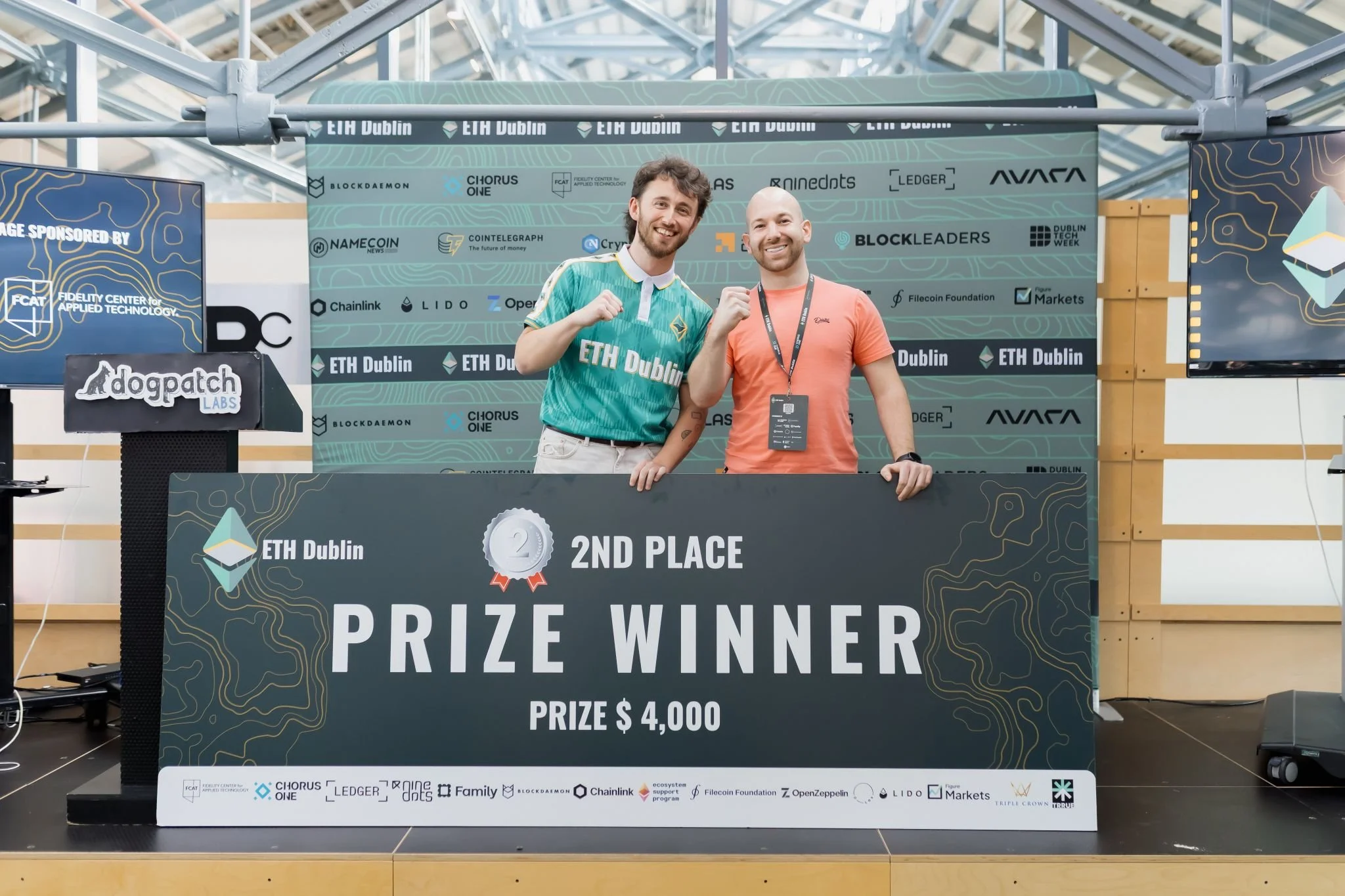Latinum: I see a world in eighteen months where an AI agent handles all everyday online transactions for you”
Pictured: Latinum cofounders Dennj Osele and Brendan Regan
Latinum, a startup operating at the apex of AI agents and cryptocurrency, poached their name from the currency used in Star Trek. As the call is connecting, I’m cycling through my memory to remember other Trekkie trivia, but thankfully, my knowledge is never tested. After a quick “I think you’re on mute” exchange, Brendan Regan is talking about something more universal, something that crosses everyone’s mind in the late summer: booking holidays.
“Basically all of your everyday digital commerce in the future will be handled by AI agents rather than you doing it yourself. The example on our website is buying a bunch of bananas, but it could be ordering groceries or a taxi, or even booking a whole holiday. I can’t see a world in eighteen months where an agent doesn’t handle everyday transactions online, instead of you.”
Regan and his cofounder Dennj Osele are building Latinum, which they see as “the default wallet that helps agents to pay and get paid online.” The two cofounders both believe that agents are the cornerstone of the next phase of the online economy, so they decided to build the company that will help those agents transact.
AI agents are the exciting new frontier of the internet. Startups across the world are scrabbling to establish an advantage by creating the most exciting agents: whether it is automating the most boring, repetitive tasks in our lives, or derisking processes with a high chance of human error.
Regan and Osele have a bold vision for this future. One piece on their website predicts “The End of Mobile Apps.” The thinking goes: if an AI agent can instantly search every available option to call a cab, find the cheapest one, and book it seamlessly, why would you need Uber, Lyft, and taxi apps cluttering your phone? Latinum's vision extends beyond ride-hailing to travel booking, food delivery, and virtually every form of digital commerce.
Even in the realm of tech startups, Latinum is the newest of the new. The mold is barely old enough for them to break. The company’s product, which seems complex at first look, is built on three pieces of technology. The first is an HTTP 402 Request, a web protocol that gives AI agents the ability to validate transactions: essentially a digital paywall that tells an agent how much a product or service will cost.
The second is Anthropic’s MCP (Model Context Protocol), which was released last November and has steadily been gaining popularity since the turn of the year. The final piece is stablecoins: a digital and machine-native currency backed by fiat dollars and government bonds.
Model Context Protocol is an open-source protocol developed by Anthropic, the AI behemoth behind Claude, one of the big three LLMs alongside OpenAI’s ChatGPT and Google’s Gemini. It allows AI agents to connect with external tools or databases, meaning that they can now access files, interact with a data source to verify information, and even execute payments, the part that makes Regan and Osele so excited. If HTTP 402 gives Latinum an accelerator and brake pedal to allow agents to pay (or not pay) for things online, MCP provides the engine.
By open-sourcing MCP and seeing widespread adoption, Anthropic are hoping that they have just invented the future industry standard. A pleasant side effect of this decision for Latinum is that high-growth startups and talented developers can leverage MCP servers to build powerful agents by connecting them to any external service, whether it’s your email, Google Calendar, or even a wallet.
“To us, monetising AI agents seems obvious, but the technology is so nascent,” says Regan. “We’re trying to find the most exciting and innovative agents because those are the ones that are going to need to monetise first. And those agents are leveraging MCP.”
When thinking about the possibilities for AI agents and the tantalising thought of never using a particular low-cost airline’s clunky website ever again, my eye is drawn to a segment on Latinum’s homepage. It holds a series of no less than fifteen hypotheses: principles in which the two founders share a mutual belief. They read like a sort of internet scripture, a way of interpreting the future: everything from ‘Micropayments will replace most subscription models in agentic commerce” to “SEO will shift from search engines to optimization for AI agents.”
“When Dennj and I first met, we felt the same way about how things are going to unfold in the new world that AI has created and kept a running order of these principles in our Notes app.”
Co-founder Brendan Regan pitching Latinum at the NDRC Accelerator
Regan always had an entrepreneurial streak lurking beneath the surface, even as he carved out a successful career in banking at Barclays and Citi. He jumped ship to join Entrepreneur First with a couple of fintech ideas that didn’t quite work out, before another stint leading the European revenue function at Plaid. Soon though, he caught the bug again, moving back to Ireland and joining the Founders programme in Dogpatch Labs where he met Osele, a former AI engineer at Amazon with deep experience in machine learning.
The two hit it off immediately and started throwing ideas back and forth. Osele had worked on training large language models for Alexa, so had lots of ideas on how a giant like Amazon could leverage agents in the future.
“Dennj is a great cofounder to work with,” says Regan. “He's an engineer by trade, so he’s obviously very sharp, he has a ton of good ideas, and he has the ability to cycle through them very quickly.“
Regan is conscious that with nascent technology underpinning their product, they have an advantage over the big payments companies that “have theories about how agents should transact, but payments made by agents remain a very nascent space.” By building technology that actually enables these payments and making it both interoperable and open-source, Latinum can operate at the coalface of a new world, facilitating some of the first agentic payments.
“With Latinum orchestrating the early pure agentic transactions where an agent is deciding what to buy and how to buy it, we are developing a stronger sense of where future bottlenecks will appear and what direction the market will go in."
It’s a convincing argument, and I’m not the only one who thinks so. Latinum only formed in February, but their reputation has grown significantly in the community. In addition to podium positions at Solana Europe Demo Day and the ETH Dublin Hackathon, Latinum recently won Colosseum, the largest cryptocurrency hackathon in the world. Pocketing the $25,000 prize would be helpful for any fledgling startup, but triumphing over 10,000 other participants from 142 countries brought something much more valuable: attention.
"We are building in a very exciting space and investors are trying to predict what infrastructure will power the agentic web. By leveraging innovative technologies like MCP, 402 requests and stablecoins, we are putting ourselves in a strong position to help developers monetise their products."
EthIreland founder present 2nd prize to Latinum’s Osele, May 2025
With Latinum, Regan and Osele are building a new infrastructure for how people operate online. They can see the different forces competing for power in the future of online payments. However, only one of these is machine-native, which is why they believe that stablecoins will triumph at the expense of large (and possibly lumbering) incumbents.
“There is enormous value in this market, which is why all of the big payments companies and card networks are trying to dictate their version of the future,” he says. “There are three ways this can unfold: agentic card payments, crypto and stablecoins, or a kind of PayPal for agents.”
Regan pauses for a moment, aware of the constant uncertainty that comes with defining a new market. “For the first twelve, eighteen months, we will see all three of those options depending on the use case, but in the long run we firmly believe stablecoins & programmable money will underpin agentic commerce."




